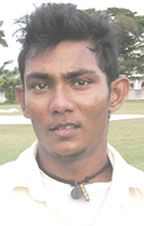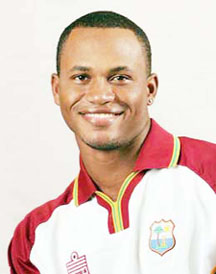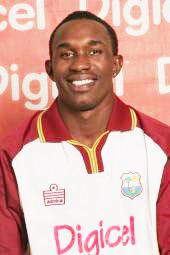By Tony Cozier
At the ICC World Cup In DELHI
The West Indies’ choice of their third substitute player for the current World Cup is as bewildering as that of Cameron Cuffy for Carl Hooper at the 1996 version.
Seeking a replacement for Dwayne Bravo, an out-and-out all-rounder injured in the first match against South Africa, they initially turned to an unwilling Marlon Samuels, an out-and-out batsman, and then to Davendra Bishoo, an out-and-out bowler.

Now that Bishoo has arrived in India, the selectors on the ground have to determine how best to use the exciting Guyanese leg-spinner on his first call-up to highest international duty in the game’s foremost event.
Although it doesn’t explain the initial preference for Samuels, the reason was apparently based on the clear, but hardly surprising, evidence that pitches in India and Bangladesh, where the West Indies’ group stage matches are scheduled, are dry, abrasive and favour spinners.
In addition, they were seeking a wicket-taker to augment the inhibiters Nikita Miller and Chris Gayle. The early success of Imran Tahir, South Africa’s new Pakistan-born leg-spinner, would have been another factor.
Bishoo arrived in Dhaka only three days before last Friday’s match against Bangladesh and had a couple of long bowls in the nets that impressed head coach Ottis Gibson.
He was seriously considered but not eventually included in the final eleven, Miller keeping his place. As it turned out, only three bowlers were required to roll Bangladesh for their record-low 58.
The West Indies’ three remaining group matches are against Ireland in Mohali on Friday and England on March 17 and India on March 20 in Chennai.
Yesterday, Gibson, captain Darren Sammy and others in the team who influence selections would have followed how England managed against Tahir (not very well on a rough pitch) and Ireland against the wayward Indian leggie Piyush Chawla (none for 56 off eight overs). The exercise would have been inconclusive.

More revealing would have been England’s resurgence in a six-run victory over South Africa in Bangalore and Ireland’s continued pluckiness against an Indian team and 40,000 of their supporters in Chennai.
Bishoo, 25, is set to become the first wrist spinner in senior West Indies colours since Dave Mohammed played the last of his five Tests in November, 2006
(SPORTS DESK: Please check).
He first came to wider notice after the touring Sri Lankans gave favourable reports when he bowled for a President’s XI in a practice match at Providence on their 2008 tour of the West Indies.
His development has continued apace since, both at first-class level (86 wickets in 21 matches at 27.31 runs each) and in the regional 50-overs and T20 tournaments.
On the face of it, his call-up, and the background to it, are typical of the ambiguity so common of West Indies panels. Cuffy, a fast bowler and tailend rabbit, for Hooper, class batsman and steady off-spinner, was a prime, but not sole, example.
Bravo, a genuine and experienced all-rounder described by head coach Ottis Gibson as the “energiser of the team” so badly wrenched his knee bowling in the opening match against South Africa that he could take no further part in the match or the tournament. He now requires a remedial operation in Australia.

As a result, the decision-makers back in the Caribbean first turned to Samuels, a batsman debarred from bowling because of an illegal action instead of the like-for-like all-rounder, Dave Bernard.
Samuels, 30 and with a record of 27 Tests and 109 ODIs before receiving a two-year suspension in 2008 for his marginal involvement with a dodgy Indian bookmaker, was amassing runs in the regional competitions like a modern-day Maurice Foster.
He declined the offer, pleading that he was “not yet ready to return to the international arena”.
Chairman of selectors Clyde Butts simply added to the puzzle by stating that Samuels “agrees with the selection committee that to return to international cricket at this stage, particularly in the high pressure situation of the Cricket World Cup would be too rushed”.
Since Butts and his colleagues felt that it would be “too rushed” to pick him, it begged the obvious question of why did they approach him in the first place.
So someone else had to be found and that is where Bishoo came in. His is an opportune opening.









